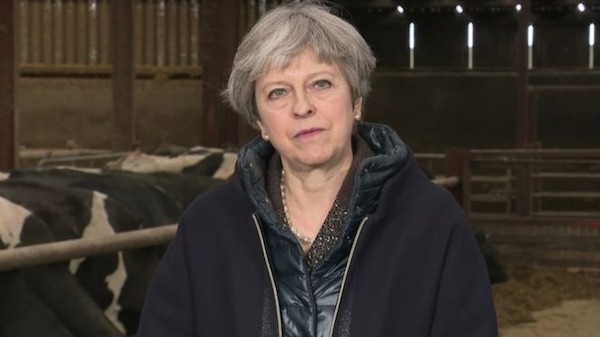
On the twentieth anniversary of the Good Friday Agreement, a desultory media exercise by British Prime Minister Theresa May at a farm in County Down has added to the belief that political atrophy in London means there will be no revival of the Stormont powersharing institutions in the short term.
May was visiting the farm as as part of a “whistle-stop” tour of jurisdictions under British rule to promote Britain’s exit from the European Union a year ahead of the date when it will take effect.
On her visit to the dairy farm between Belfast and Bangor, she did not conceal the fact that the peace process and the Good Friday Agreement were not on her list of concerns.
Rejecting a call to visit the border area, which will suffer most heavily from her determination to pull the north of Ireland out of the EU Customs Union, May focused repeatedly on unspecified “opportunities”.
The issue of the Customs Union is at the heart of the ongoing disagreement about Brexit within the Conservative Party, with leading figures such as former Cabinet minister Chris Patten warning that the north of Ireland could go back to violence.
Patten urged the British government to be “very careful” over how Brexit impacts on the border. The former chair of a commission into policing in the north of Ireland as part of the peace process, said: “I feel emotionally very strongly about this. I think we did a really good job on the Good Friday Agreement. And I don’t want to go back to the days when people were being shot and maimed.
“There is a simple answer to the Northern Ireland border question and to much else besides. Let’s stay in the Customs Union.”
He hit out at pro-Brexit Tories such as Boris Johnson who spoke generally of a “Brexit dividend” without the experience of negotiating a trade deal. “One problem is that the ministers who talk about these fictitious trade deals have never negotiated one,” he said. “The closest they have come to a trade deal is the checkout at Waitrose.”
But in speech after speech, May this week sought to promote the benefits of Brexit for “the four nations across the United Kingdom”.
She said she had come to Bangor to “listen to farmers” in the Six Counties to hear “what they want to see coming out of Brexit, what are the opportunities for Northern Ireland in the future”.
“Brexit provides us with opportunities,” she declared. “I want to see us coming together, the four nations across the United Kingdom.
“We have a very strong union, that is in our interests and it is in our interests to come together and really seize these opportunities for the future.”
Sinn Fein’s Gerry Adams, who was is in London, said that whatever the outcome of the Brexit negotiations, the 1998 Good Friday Agreement remains under grave threat.
“The Tory government intends to end the jurisdiction of the European Court of Justice; to withdraw from the EU Charter of Fundamental Rights; and to repeal the Human Rights Act,” he said.
“These measures threaten the core Human Rights elements and safeguards of the Good Friday Agreement.
“For its own narrow, party political, and selfish reasons, the Tory government has actively encouraged the most negative, intransigent, and sectarian elements of political unionism to attack and undermine the Good Friday Agreement. No one should be surprised by this. This is the historical record of British Conservatism’s relationship with Ireland and its disgraceful exploitation of unionism.
“It is therefore critical that progressive elements in Ireland and Britain unite to defend the Good Friday Agreement. Our responsibility must be to ensure that all aspects of the Good Friday Agreement are implemented in full.”
He said the Good Friday Agreement committed the British government to “hold a referendum on unity and to legislate for a united Ireland should a majority vote for that outcome”.
He said Sinn Fein believes that there should be a referendum on Irish unity within the next five years.
“Progressives and democrats need to demand that the British and Irish governments agree a date for such a referendum,” he said.
“We also need to plan for that referendum and to agree the new political strategies that will be required to win it.
“After almost 100 years of a failed partitionist system and centuries of British involvement in Irish affairs, it is time for the Irish people, all of us on the island of Ireland, to shape out our own future.”
![[Irish Republican News]](https://republican-news.org/graphics/title_gifs/rn.gif)
![[Irish Republican News]](https://republican-news.org/graphics/title_gifs/harp.gif)

